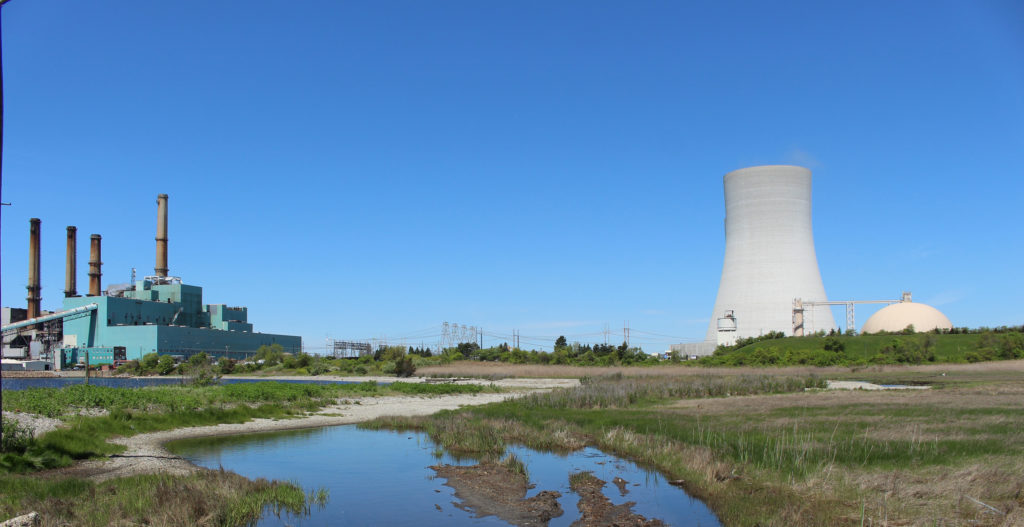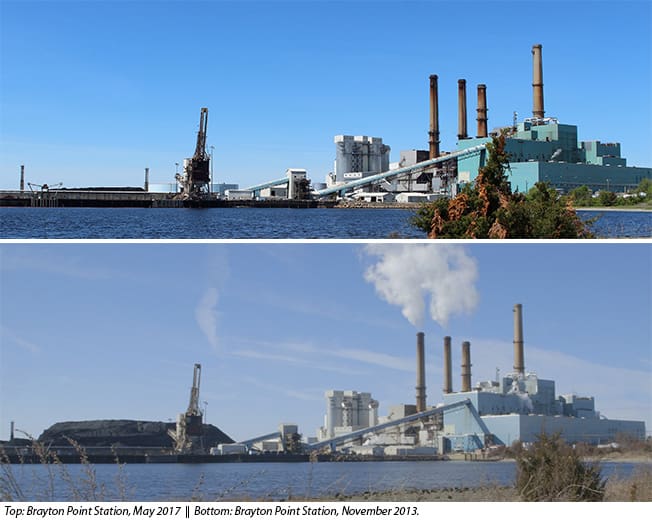
Massachusetts last coal-fired power plant stopped production today after almost 50 years of operation.
Today, New England’s largest coal plant shut its doors. Brayton Point Station in Somerset, Massachusetts, shuttered production today after roughly 50 years of spewing air, water, and carbon pollution into the South Shore air and the Mt. Hope Bay.
For years, Conservation Law Foundation and our allies worked tirelessly to close the outdated power plant. Our independent analysis of Brayton’s financial future painted a bleak picture for the plant, so it was no surprise when, in 2013, Brayton Point’s owners Dominion Energy sold the plant to Energy Capital Partners, an energy investment company based in New Jersey. The newly minted owners promptly signaled that the plant would close no later than June 2017.
As the last coal-fired plant in Massachusetts, Brayton’s closing spells the end of coal in New England. Because while New Hampshire still has two coal plants (both older and more expensive to run than Brayton Point), they are slated to be sold in the next few years and will not survive on the open market without taxpayer subsidies propping them up. Meanwhile, Connecticut’s Bridgeport Station has already indicated that it will close its own doors by 2021.
Currently, coal makes up only 2% of New England’s energy mix , a number that includes Brayton Point. So the future of coal is clear: Now that Brayton Point has closed, and with New England’s last three coal plants headed in the same direction, dirty coal (and its negative effects on people’s health, our environment, and our climate) is done in New England.

So What’s Next for New England’s Energy?
The move away from coal and towards renewables like wind and solar is good for New England residents. But we need to do more. Right now, we get nearly 50% of our energy from another dirty fossil fuel, natural gas. This overreliance on natural gas isn’t good for our climate or our future. So the next step is for New England to move away from fossil fuels entirely and embrace the cost savings, energy abundance, and job creation potential that renewable energy represents. A few examples:
- Offshore Wind. The Block Island Wind Project in Rhode Island has shown that offshore wind can be successfully built and used to save everyday people money. This smaller-scale project proves that offshore wind can both reduce energy bills and bring jobs to the region. And now, Massachusetts is looking towards offshore wind as well. With the success of the Block Island Wind Project, the Bay State is looking to generate 1600 megawatts of power (enough to power almost 800,000 homes and businesses) from offshore wind and is almost ready to solicit proposals for companies to help build out this exciting new energy economy here in New England.
- Solar. Installing solar panels on homes and small businesses saves everyone money. It helps reduce energy demand during peak hours and saves money on things like transmission costs (as energy is produced locally, right where it’s needed, when it’s needed). But while solar has been gaining ground in New England, a few states like Maine and New Hampshire are slipping backwards on their solar progress. That said, if more New Englanders demand better solar policies, this energy generator could become a real powerhouse for our energy grid, and a real money-saver for everyday New Englanders.
- Energy Efficiency. Energy efficiency is the dark horse of the energy game. While solar panels or wind turbines might be the more obvious clean energy generators, the cleanest (and cheapest) energy is the energy we don’t use at all. Energy efficiency reduces the amount of energy we use by simply being smarter about how we use it. Many states have programs to encourage businesses and consumers to be thrifty about their energy use (for instance, shifting peak energy usage times in factories). If we encourage these energy efficiency measures, all New Englanders can save on our electricity bills, while at the same time cutting climate-damaging emissions.
Overall, Brayton Point Station’s closing is a signal to New England (and the nation) that residents and businesses are ready for the future. Specifically, a future that doesn’t involve coal or even natural gas, and instead focuses on clean, local, renewable energy.



